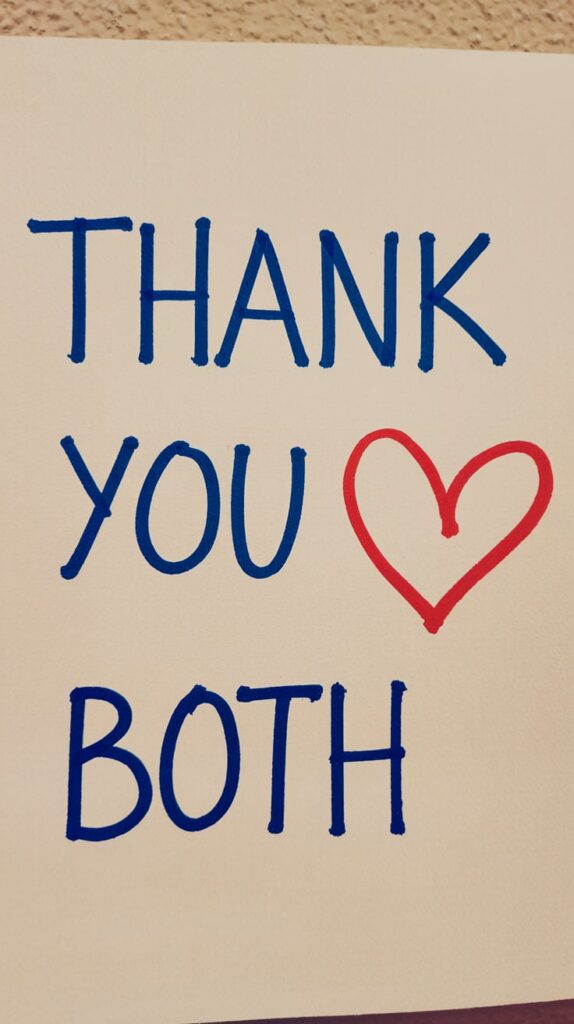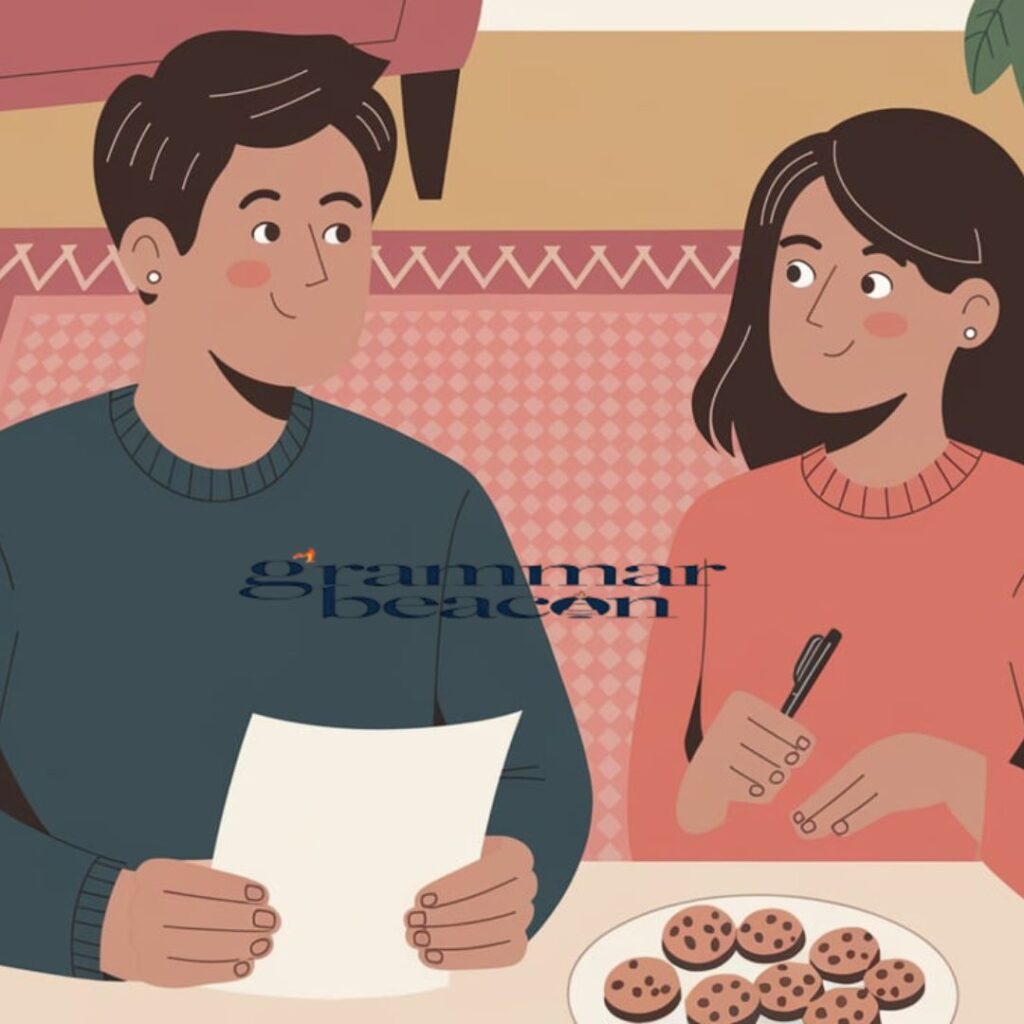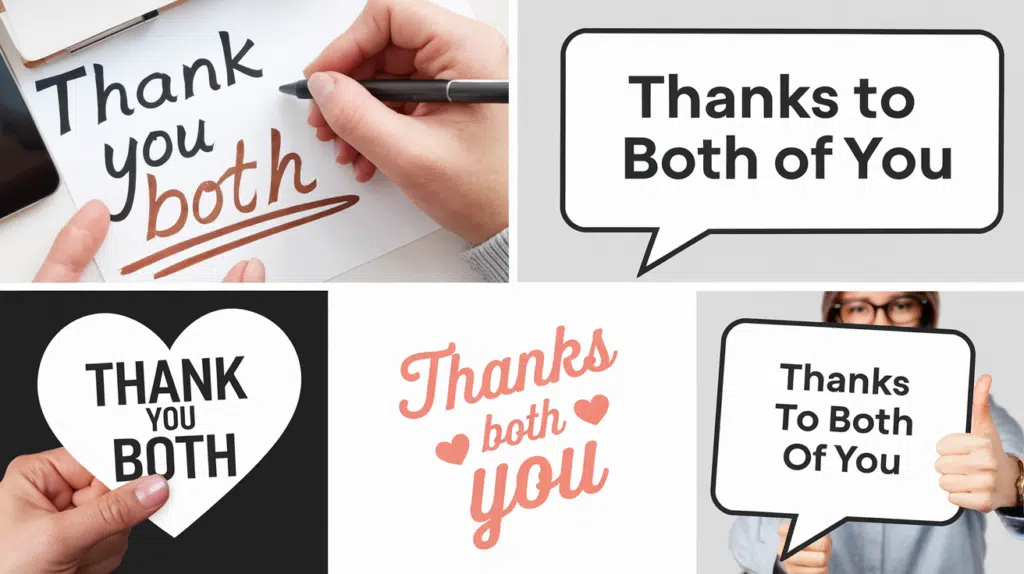Expressions of gratitude are vital in building and maintaining relationships, whether personal or professional. Two phrases that often arise in conversations of thanks are “thank you both” and “thanks to both of you.”
While these phrases may seem interchangeable at first glance, they convey different nuances of appreciation. In this article, we’ll explore the meanings, contexts, and appropriate usages of these phrases.
We will also provide examples, delve into their emotional significance, and examine how they fit within cultural norms and communication practices.
Understanding the Phrase “Thank You Both”

“Thank you both” is a direct expression of gratitude directed at two individuals. It is concise and straightforward, making it suitable for various contexts, from casual conversations among friends to more formal settings, such as workplace acknowledgments.
Situational Usage
Casual Settings: You might say, “Thank you both for coming to my party!” This usage conveys a warm, friendly tone.
Professional Settings: After a team meeting, you could state, “Thank you both for your valuable input during our discussion.” Here, the phrase maintains professionalism while expressing appreciation.
Emotional Impact
Using “thank you both” helps foster positive feelings between the speaker and the recipients. It signifies recognition and can enhance interpersonal bonds, creating a sense of community and support.
Understanding the Phrase “Thanks to Both of You”
“Thanks to both of you” also expresses gratitude but emphasizes the actions of the recipients. This phrase often implies that the gratitude stems from a specific action or event, making it slightly more complex than the previous phrase.
Situational Usage
Acknowledging Help: In a scenario where two friends helped you move, you might say, “Thanks to both of you for your hard work yesterday.” This usage highlights the effort they put into helping you.
Recognizing Contributions: After a successful project, you might express, “Thanks to both of you, we achieved our goals ahead of schedule.” Here, the phrase reinforces the direct impact of their contributions.
Emotional Impact
This phrase carries a deeper emotional weight as it attributes the gratitude to specific actions. It can evoke a stronger sense of appreciation, encouraging continued support and cooperation.
Key Differences Between “Thank You Both” and “Thanks to Both of You”

The primary difference lies in the structure and the implied meaning. “Thank you both” is a more straightforward acknowledgment of gratitude, while “thanks to both of you” implies a cause-and-effect relationship, attributing the speaker’s feelings of gratitude to specific actions taken by the recipients.
read more : 30 Other Ways to Say “Let’s Blow This Popsicle Stand” – Grammar Beacon
Examples of Each Phrase
- Thank you both: “Thank you both for your kindness during my recovery.”
- Thanks to both of you: “Thanks to both of you, I was able to get back on my feet faster.”
Emotional Resonance
While both phrases convey appreciation, the emotional resonance can differ based on the context. “Thank you both” tends to be more immediate and direct, while “thanks to both of you” may evoke deeper feelings of appreciation, especially when the actions taken were significant.
20 Sentences with the Phrase “Thank You Both”
- Thank you both for your assistance with the project; it wouldn’t have succeeded without your help.
- After the presentation, I said, “Thank you both for your constructive feedback; it really helped me improve.”
- At the end of the event, I expressed, “Thank you both for organizing such a fantastic gathering.”
- In a team meeting, I remarked, “Thank you both for stepping up and leading the discussion.”
- Thank you both for your support during my difficult times; I truly appreciate it.
- After a long day, I turned to my friends and said, “Thank you both for being such amazing companions.”
- Thank you both for the lovely surprise party; it meant the world to me.
- As I left the meeting, I said, “Thank you both for your insights; they will help us move forward.”
- In a thank-you note, I wrote, “Thank you both for your generous gift; it was incredibly thoughtful.”
- After receiving help with my resume, I said, “Thank you both for your valuable advice.”
- When my colleagues helped with my presentation, I expressed, “Thank you both for your support; I couldn’t have done it without you.”
- At dinner, I said, “Thank you both for cooking such a delicious meal; it was fantastic!”
- After a successful project completion, I emailed my team, saying, “Thank you both for your hard work and dedication.”
- Thank you both for being there during my stressful moments; your support was invaluable.
- When receiving gifts, I expressed, “Thank you both for thinking of me; your kindness is appreciated.”
- After a team outing, I remarked, “Thank you both for making it such a fun day.”
- Thank you both for your patience while I figured everything out; it really helped me.
- After a successful meeting, I said, “Thank you both for your contributions; they made a big difference.”
- When my friends assisted with my move, I said, “Thank you both for your time and effort; I owe you one!”
- As we wrapped up our volunteer work, I expressed, “Thank you both for your commitment to helping others.”
20 Sentences with the Phrase “Thanks to Both of You”
- Thanks to both of you, we were able to finish the project ahead of schedule.
- I want to express my gratitude; thanks to both of you, I gained valuable insights.
- After the event, I said, “Thanks to both of you for making it such a memorable occasion.”
- Thanks to both of you, I managed to navigate my way through the challenges.
- In a team meeting, I remarked, “Thanks to both of you, we secured that important deal.”
- After receiving help on a presentation, I said, “Thanks to both of you, I feel more confident.”
- I expressed my appreciation: “Thanks to both of you for your guidance during my internship.”
- After a successful collaboration, I remarked, “Thanks to both of you, we achieved our targets.”
- I sent a thank-you note: “Thanks to both of you for your efforts in organizing the fundraiser.”
- After a productive brainstorming session, I said, “Thanks to both of you, we generated some great ideas.”
- Thanks to both of you, I was able to see things from a new perspective.
- I recognized their efforts: “Thanks to both of you, our team is stronger than ever.”
- Thanks to both of you, I learned how to handle the situation more effectively.
- In a conversation about teamwork, I mentioned, “Thanks to both of you, we accomplished so much.”
- Thanks to both of you, my fears about the presentation were alleviated.
- After they helped me during a crisis, I said, “Thanks to both of you for being my rock.”
- I expressed gratitude: “Thanks to both of you, I felt supported every step of the way.”
- Thanks to both of you, I was able to meet my goals more efficiently.
- After receiving help with planning an event, I said, “Thanks to both of you, everything went smoothly.”
- In a follow-up email, I wrote, “Thanks to both of you for your quick responses; it made a huge difference.
Meaning of ‘Thanks’
At its core, “thanks” is an expression of gratitude. It signifies acknowledgment and appreciation for someone’s actions, kindness, or support. Understanding the meaning of “thanks” can help individuals express their gratitude more effectively.
Contextual Understanding
In different contexts, “thanks” can vary in intensity and formality. For instance, saying “thanks” to a close friend might sound casual, while using “thank you” in a formal setting may convey more respect and sincerity.
Emotional Significance
Gratitude has significant emotional implications. Expressing thanks can foster positive relationships and improve interpersonal dynamics. It can also contribute to one’s overall emotional well-being, reinforcing feelings of connection and appreciation.
Variations and Forms of Gratitude
Expressions of gratitude can take many forms, ranging from simple “thanks” to more elaborate phrases such as “I truly appreciate your help.” Here are a few common variations:
- Thank you so much.
- I really appreciate it.
- I’m grateful for your assistance.
- Thanks a lot!
- I can’t thank you enough.
Contextual Variations
The context often dictates the variation used. In casual conversations, simpler expressions like “thanks” or “thanks a lot” may suffice. In more formal settings, it might be appropriate to use “I sincerely appreciate your help” to convey deeper appreciation.
Use Cases for “Thank You Both” and “Thanks to Both of You”

- Team Meetings: In a team environment, acknowledging contributions can enhance morale and encourage collaboration.
- Networking Events: Expressing thanks to colleagues or potential business partners fosters goodwill and opens doors for future interactions.
Personal Use Cases
- Social Gatherings: Thanking friends or family for their support strengthens relationships and fosters a sense of community.
- Special Occasions: During birthdays or anniversaries, expressing gratitude can make celebrations more meaningful.
Politeness and Etiquette
Expressions of gratitude vary across cultures. In some cultures, thanking others is a fundamental aspect of social interactions, while in others, it may be less emphasized. Understanding these cultural nuances can enhance communication and prevent misunderstandings.
Appropriate Usage
Using the right phrase in the right context reflects emotional intelligence and social awareness. Choosing “thank you both” or “thanks to both of you” appropriately can signal respect and acknowledgment of the recipients’ efforts.
Psychological Effects of Gratitude
Expressing gratitude can lead to positive psychological outcomes. Studies suggest that individuals who regularly practice gratitude experience higher levels of happiness and lower levels of depression.
read more : Openned Or Opened: Spelling + Examples – Grammar Beacon
Building Resilience
Gratitude can also help individuals build resilience, allowing them to cope with challenges more effectively. Recognizing the support of others can foster a sense of belonging and security.
Frequency and Usage of Gratitude Phrases
The frequency of gratitude expressions in everyday conversation varies based on individual personalities and social contexts. Some people naturally express gratitude more often than others.
Informal vs. Formal Usage
- Informal: In casual settings, phrases like “thank you both” might be used frequently.
- Formal: In professional environments, more structured phrases like “thanks to both of you” may be preferred to reflect a higher degree of professionalism.
Conclusion

Understanding the differences between “thank you both” and “thanks to both of you” is essential for effective communication. By utilizing these phrases appropriately, you can express gratitude in ways that resonate with your audience and strengthen relationships.
Whether in casual or professional contexts, the power of gratitude remains a vital element of interpersonal communication.Ultimately, expressing gratitude fosters positive interactions and builds a culture of appreciation.
So, the next time you find yourself feeling thankful, consider which phrase might best convey your sentiments. After all, acknowledging the efforts of others not only uplifts them but also enriches your own experience in the process.

James Logan is a seasoned blogger and language enthusiast behind Grammar Beacon. With years of experience in grammar and writing, James shares his expertise through insightful and engaging content. His passion for clear communication and linguistic precision shines in every post, making complex grammar concepts accessible and enjoyable for readers. Follow James for expert advice and tips to refine your writing skills.







